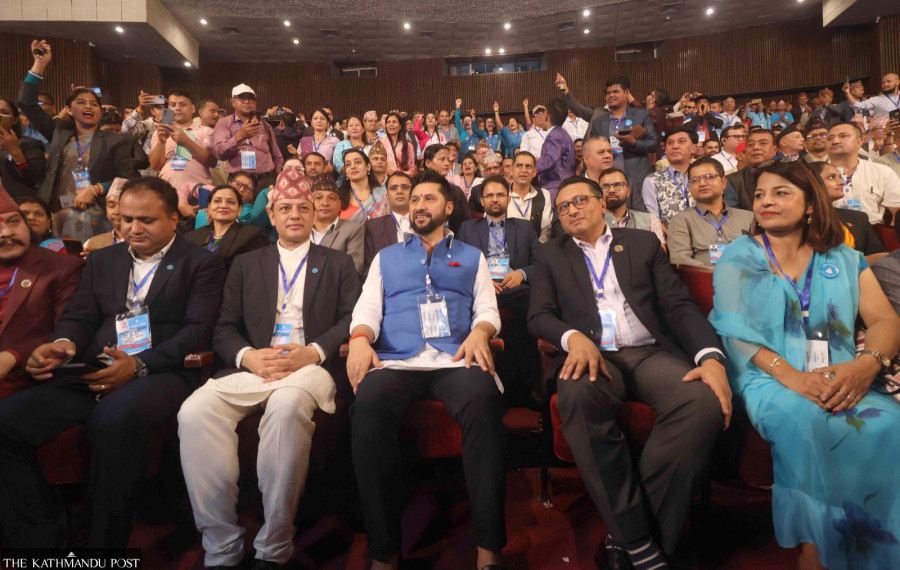Politics
RSP meet fails to inspire representatives
Party spokesperson says there is a lack of ‘synchronisation’ among top party leaders.
Purushottam Poudel
Representatives at the first national conference of the Rastriya Swatantra Party saw factionalism within the party.
Some of the representatives who arrived in Kathmandu three days ago for the two-day gathering starting on Tuesday said that growing factionalism is not healthy for the new political outfit promising to challenge traditional forces like the Nepali Congress and the CPN-UML.
“We were told that factionalism existed in our party in various forms, but we denied such claims. However, during our three days in Kathmandu, we witnessed it,” a group of party members told the Post. It seems that President Rabi Lamichhane and Vice-president Swarnim Wagle are not in the same boat on how the party should function, they added.
RSP acting spokesperson Manish Jha explains that it is the lack of synchronisation—rather than differences—between the leaders. “People from various schools of thought came together to form the RSP. It is true that we lack synchronisation, but it would be wrong to portray it as differences.”
Another leader of the party said on condition of anonymity that the party has two schools of thought—one based on democratic principles and the other opposed to it.
RSP acting general secretary Kabindra Burlakoti claims that the party is united.
In conversations with the Post, representatives from Kathmandu Valley, Pokhara and Chitwan sounded more optimistic with the central leadership while those from remote areas were confused over their take on the party’s central leadership.
The representatives from Madhesh were mild in their opinion about the leadership.
Moreover, representatives were also not very positive about the way the central leadership is investing their energy to claim that Lamichhane had got a clean chit from the parliamentary special committee formed to investigate crisis-ridden cooperatives.
The probe panel, which submitted its report to the House of Representatives, has recommended the government prosecute Lamichhane, along with his former business partner GB (Gitendra Babu) Rai, board member of the media Kumar Ramtel and initial founder Chhabi Lal Joshi as per the prevailing laws. The inquiry committee, however, has said it couldn’t establish Lamichhane’s role in rerouting the cooperatives fund to Gorkha Media Network.
“It would have been better had the central leadership waited to see how the government would take action,” the group of representatives from western Nepal told the Post. “In case Lamichhane is booked under the law, it could be counterproductive for the party in the long run.”
The political campaign started by the RSP won’t get stalled even without Lamichhane, the representatives said, expressing their confidence in the party’s longevity.
Lamichhane also presented a political report incorporating proposed statutory changes, the party’s commitments to voters, policy agenda presented by Swarnim Wagle at the Jaleshwar meeting and the conclusion drawn from the closed session of the national conference.
Lamichhane’s report states that the policy paper presented in Jaleshwar defined ‘constitutional socialism’ as the party’s political ideology.
Lamichhane also accuses the ruling Nepali Congress and CPN-UML of trying to lead the country to a two-party system by polarising smaller parties.
“On the pretext of administrative reform, they are planning to wipe out the existence of small parties,” the report reads. “Potentially, this step can bring together new parties that want to be an alternative political force sooner or later.”
Asked about RSP’s possible alliance with other parties, Burlakoti said though they are not in talks with the main opposition CPN (Maoist Centre), they are in regular contact with several independent candidates of last election.
Asked if they are in discussion with Kathmandu Metropolitan City Mayor Balendra Shah, who won the 2022 local election independently, Burlakoti said: “Strategic moves are not to be disclosed.”
However, when the national conference concluded after Lamichhane presented his report, representatives arriving from around the country were displeased.
“This is not the way a party functions,” a representative told the Post, asking not to be named for fears of reprisal.
When leaders put themselves at the centre and cadres in the periphery, the party’s downfall begins, another representative said.
Acting General Secretary Burlakoti, however, defended the party leadership.
“Our national conference was designed this way,” Burlakoti said. The report presented by the chair will be discussed in the party’s Mahakali-Mechi campaign that will start soon, he added.
“At the national conference, we gave 5 percent of the total representatives (1500) time to speak, but those who spoke exceeded that number,” Burlakoti said.
The conference, however, passed Lamichhane’s report. On Wednesday, Lamichhane announced the date of the party’s first general convention. It will be held on May 8-10 at a yet-undecided venue.
“I would like to inform you that the Central Committee has become the general convention organising committee,” Burlakoti said. Lamichhane also announced the ‘Mahakali-Mechi Campaign’ to interact with the general public.
In his report, Lamichhane has proposed a person not affiliated to any party to be elected the country’s president, directly elected executive head, or the prime minister. He also proposes giving the nation’s vice president the responsibility to chair the National Assembly.
While the paper bats for a fully proportional electoral system, it says provincial assemblies cannot be accepted in the current shape.
However, this does not mean the RSP is against the federal structure gained through the sacrifice of thousands of people, another representative said.
“Our party has no strength to amend the constitution and scrap the federal structure. Therefore, for the time being, voices are growing among the party members about accepting the present political structure,” Khemraj Koirala, a conference representative from Kailali told the Post.
Party members also suggested downsizing the number of ministers to make the provincial system functional, Koirala said.
The report also stands for reducing the number of municipalities to less than 500, from the current 753.




 10.12°C Kathmandu
10.12°C Kathmandu















